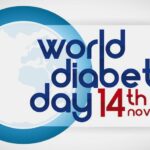This year’s celebration of World Diabetes Day offered a unique opportunity for Nigerians to learn more about the insidious nature of this silent killer that is currently ravaging lives, both old and young. The pictures being painted by credible medical professionals about the menace of this disease are troubling and call for immediate actions by both citizens and private and government organisations to halt its spread and offer hope to those already affected.
Figures released by the Diabetic Association of Nigeria on this disease are pretty frightening, with as many as 11 million Nigerians said to be suffering from it currently. Another 11 million of our people, according to the association, are ignorantly carrying the disease. Still, another 20 million Nigerians, the medical professionals disclosed, are said to be “pre-diabetes,” which means that such persons have borderline diabetes.
What makes diabetes such an uncommon danger is that it has been linked to many other health conditions, such as limb amputation, kidney failure, heart attacks, stroke, blindness and cancer. Therefore, its association with these additional diseases makes it a serious threat to human existence that must be tackled with all seriousness and commitment.
The above figures of the current incidence of diabetes and the projection that the numbers could double by the year 2045 are quite scary. And the pictures painted above are all the more worrisome because, as of now, diabetes remains a chronic disease; it has no known cure.
Abducted NYSC members: A/Ibom stakeholders seek Tinubu’s intervention
Kebbi gov presents N250.1bn budget for 2024
The good news, however, is that diabetes can be managed so that a patient is able to have a normal life and live to a ripe age. This has been proven by the testimonies of notable figures, even in Nigeria. However, this depends on a number of factors. The first is early detection and reporting of the condition so that treatment and management can commence early enough.
This makes a campaign on this health challenge all the more imperative so that Nigerians can know that it is not necessarily a death sentence, depending on how it is managed by the individual. Nigerians, both old and young, deserve to be told what to do to prevent it and, if they already have it, how to manage it. The successful management of the condition demands strict adherence to a new lifestyle that does not predispose the individual to increased risks.
One fact that has emerged recently is that diabetes is no longer a disease of old people, as it used to be. Nowadays, there are juvenile diabetics, with most of the cases resulting from lifestyles that bother on diets. An awareness campaign should address such issues so that parents do not assume that a child is too young to develop signs of diabetes.
There is an urgent need for such a national campaign to present a coherent and comprehensive list of the dos and don’ts of this health condition that is silently ravaging the population. Today, it is unfortunate that diabetic patients rely more on information that they pick from social media to “treat” their conditions. Unfortunately, some of these end up complicating their conditions instead of helping them because they have no credible medical basis. There is an epidemic of information on social media, and most of what is dished out is wrong or unfounded medical advice.
Unfortunately, in the absence of counter or better messages from authentic sources, most people, including patients with various health conditions, tend to rely on such messages. They take seriously all manner of prescriptions being dished out on social media as true and have adopted them as credible prescriptions for their ailments, including diabetes.
We hereby call on the Federal Ministry of Health, through its Promotion Unit, to embark on this enlightenment project, which can be done through posters with the logo of the ministry for authenticity. Such posters can contain interviews with well-informed medical professionals on this disease, with advice on what patients need to know and do. This will help to dispel all the myths surrounding diabetes and, thereby, assist patients in managing their conditions more effectively.
It must be pointed out that managing diabetes requires discipline. Those who already have it must know that for the rest of their lives, they will imbibe the culture of discipline to do anything that health managers have asked them to do in their own interest.
Nigerians, first, have to do everything possible to prevent themselves from getting this disease. This applies to everyone, but especially to those in whose lineage diabetes runs. In such cases, members of these families should not wait until they develop or manifest symptoms of the disease before they start taking action against it. Rather, they should, quite early in their lives, begin proactively taking measures to prevent them from developing the sickness. One way to achieve this, as has already been pointed out, is to adopt a proper lifestyle.
Given the potential financial costs that an explosion of diabetes in the country could impose on the nation’s economy, it is logical for all hands to be on deck to seek out ways to prevent it. This is all the more important given the poor state of Nigeria’s health sector. It certainly is not in a position to handle an explosion of diabetes, plus the other challenges already facing the sector.

 Join Daily Trust WhatsApp Community For Quick Access To News and Happenings Around You.
Join Daily Trust WhatsApp Community For Quick Access To News and Happenings Around You.
